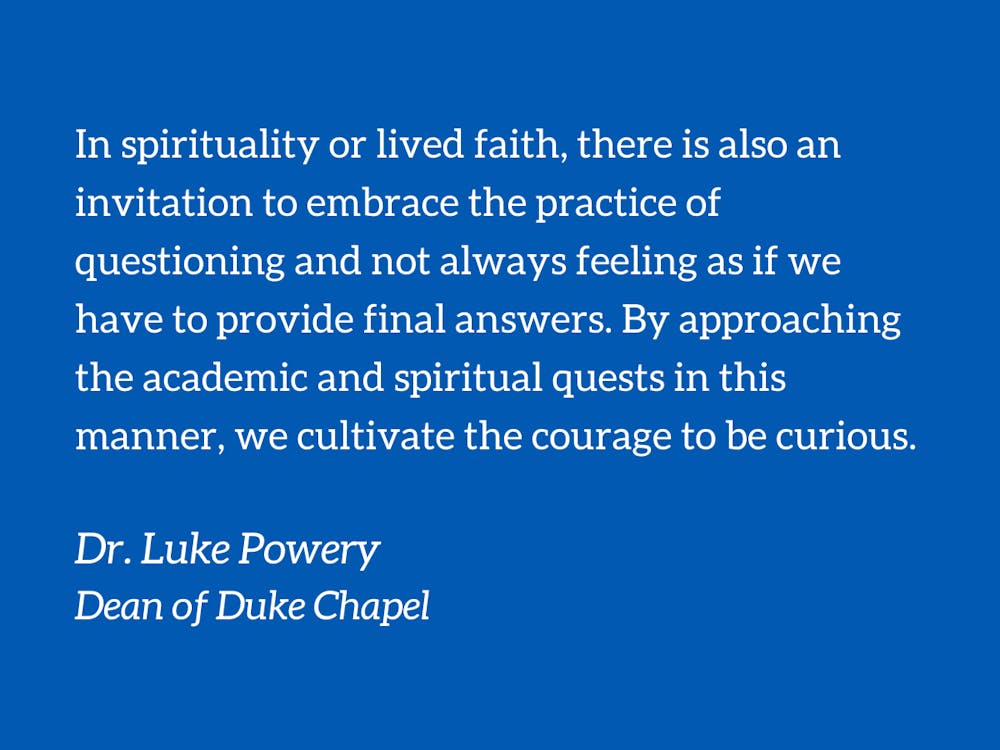Discovery is one of Duke University’s five stated values. This suggests there are insights and information across the various academic disciplines that we do not yet know. Engaging in research at a major university like Duke is a key mechanism for discovery. Having to do research implies that one doesn’t have all of the information but desires to learn more. The practice of research in any field is a way of saying, “I don’t know, but I want to know.”
This is wisdom that stretches back millennia to the writing of the Bible, when the Apostle Paul was describing a mystical experience and conveyed the limits of his understanding of it by repeating, “I do not know” (2 Corinthians 12:2-3). How about that, Dukies? There is something so honest and true about that statement — “I do not know” — even at a major research university. “I don’t know” is where we begin, and then we move on to the questions that can lead to discovery: Who? What? When? Where? Why? How?
Often in doing research, framing a relevant question is critical, because the questions we ask shape the answers we receive, so one’s research question is vital in charting a pathway toward discovery. To raise a question means we don’t have all the answers, but it also means that we are curious. It is a sign of intellectual humility. As time goes on, as some have said, the more you know, the more you realize how much you don’t know.
At a university with a value of discovery, questioning is at the heart of the academic quest. It’s also fundamental to the spiritual quest as I explored in my book of reflections, "Living the Questions of the Bible." We don’t just ask questions; our sacred texts do as well, literally. Questions point to the unknown, the unresolved, the unchartered territories and the unmarked roads. In spirituality or lived faith, there is also an invitation to embrace the practice of questioning and not always feeling as if we have to provide final answers. By approaching the academic and spiritual quests in this manner, we cultivate the courage to be curious.
My deceased mentor and former Vanderbilt University professor Dale Andrews was known to say, "I have more questions than answers, more problems than solutions. For this, I give God praise.” Professor Andrews not only inhabited a land of disequilibrium, uncertainty and incomprehensibility, but he expressed gratitude for it. He recognized the reality of human life and its creative tensions. He claimed the questions, and as a professor, he surely pursued research to discover answers to his queries. He was honest about not knowing and was courageous enough not to have to live with an attitude of certitude. He demonstrated what is key to human life and academic endeavors: questions.
In "Letters to a Young Poet," Rainer Maria Rilke wrote this to his nineteen-year-old protégé: “Be patient toward all that is unsolved in your heart and try to love the questions themselves like locked rooms and like books that are written in a very foreign tongue. Do not now seek the answers, which cannot be given you because you would not be able to live them. And the point is, to live everything. Live the questions now. Perhaps you will then gradually, without noticing it, live along some distant day into the answer.”
As you seek to discover through research and daily life, I hope you have more questions to live than answers to give.
The Rev. Dr. Luke A. Powery is Dean of Duke University Chapel. His column runs on alternate Mondays.
Get The Chronicle straight to your inbox
Sign up for our weekly newsletter. Cancel at any time.

